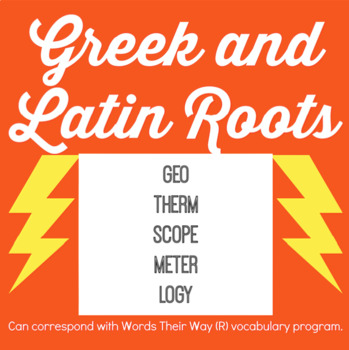GREEK/LATIN ROOT VOCAB: GEO-THERM-SCOPE-METER-LOGY - RIGOR THROUGH ANALOGIES
kind courageous classroom
4 Followers
Grade Levels
6th - 9th, Homeschool
Subjects
Resource Type
Standards
CCSSL.8.3
CCSSL.8.4a
CCSSL.8.4b
CCSSL.8.4c
CCSSL.8.4d
Formats Included
- PDF
Pages
10 pages
kind courageous classroom
4 Followers
Description
This is a complete unit of study (10 pages) for the Greek/Latin Roots Geo/Therm/Scope/Meter/Logy.
It contains a pre-test for 24 words using the above-mentioned roots, a process for having students personalize their studying (including a menu with activities), and a post-test that includes ten words from the original list. There are keys included for both tests and recommendations for how to introduce a unit like this to students.
This unit utilizes critical and creative thinking with choice and complexity. It prepares students for standardized assessment through analogies and integrates high-level thought with easy-to-grade multiple choice questions.
If your school uses Words Their Way(R), you will find it corresponds with Sort 29.
I am in the process of posting my analogy tests for other vocab lists and analogy instructional information. If you have a specific material you're searching for, feel free to contact me for a request. Thanks for looking!
It contains a pre-test for 24 words using the above-mentioned roots, a process for having students personalize their studying (including a menu with activities), and a post-test that includes ten words from the original list. There are keys included for both tests and recommendations for how to introduce a unit like this to students.
This unit utilizes critical and creative thinking with choice and complexity. It prepares students for standardized assessment through analogies and integrates high-level thought with easy-to-grade multiple choice questions.
If your school uses Words Their Way(R), you will find it corresponds with Sort 29.
I am in the process of posting my analogy tests for other vocab lists and analogy instructional information. If you have a specific material you're searching for, feel free to contact me for a request. Thanks for looking!
Total Pages
10 pages
Answer Key
Included
Teaching Duration
N/A
Report this resource to TPT
Reported resources will be reviewed by our team. Report this resource to let us know if this resource violates TPT’s content guidelines.
Standards
to see state-specific standards (only available in the US).
CCSSL.8.3
Use knowledge of language and its conventions when writing, speaking, reading, or listening.
CCSSL.8.4a
Use context (e.g., the overall meaning of a sentence or paragraph; a word’s position or function in a sentence) as a clue to the meaning of a word or phrase.
CCSSL.8.4b
Use common, grade-appropriate Greek or Latin affixes and roots as clues to the meaning of a word (e.g., precede, recede, secede).
CCSSL.8.4c
Consult general and specialized reference materials (e.g., dictionaries, glossaries, thesauruses), both print and digital, to find the pronunciation of a word or determine or clarify its precise meaning or its part of speech.
CCSSL.8.4d
Verify the preliminary determination of the meaning of a word or phrase (e.g., by checking the inferred meaning in context or in a dictionary).





